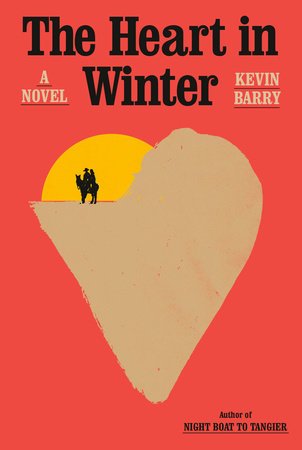Doomed Love, Broken Promises, and the Fatalistic Irish in Barry’s Gritty Western.

Kevin Barry | The Heart in Winter | Canongate: £16.99
Reviewed by Paul Anthony Knowles and Sam Cassells
From the moment a drunken opium-riddled Tom Rourke stumbles out of a bar in Butte, Montana in 1891 — In The Heart in Winter’s opening pages — we know he is already a long way down the fatalistic road to self-annihilation. Rourke is a self-confessed Balladmaker, poet, and low-bit criminal who feels the hands of fate closing around him, in the copper-rich town of Butte. A frontier town, full of immigrant workers, chasing a slice of the American Dream: a melting pot of debauchery, violence and criminality. Rourke etches out a living, writing letters full of false promises and declarations of love to the prospective wives of Butte’s miners back in Ireland, promising them a better future in the American West.
This is until Polly Gillespie (the new bride of the deeply devout mine captain Long Anthony Harrington) arrives in Butte, hiding her troubled past behind a new-veil of self-respectability. A life of decorum, devotion and comfort lies ahead of Polly, alongside the gnawing sensation that Harrington views her as a trophy wife; a body to produce his long-desired heir. Both Tom and Polly seem to be set on lives of disappointment, until a chance meeting between the two at the local photographic parlour ignites a passionate and tumultuous love affair between them.
Hatching a desperate plan to strike west to San Francisco, Tom robs money from his landlord (burning down his former dwelling in the process), steals a horse, and flees with Polly into the wild west. The couple’s plans set in motion a deadly game of cat-and-mouse between them and a group of mad Cornish killers — hired by the captain to bring back a kicking and screaming Polly (alongside Tom’s dead body) to him in Butte so he can dispense his own brand of justice to his runaway bride.
Barry’s writing, from this initial premise, sparkles with lyricism and melancholy as he deconstructs the enduring romanticism and mythology behind the American Western to bring us an Irish version of an 1890s Bonnie and Clyde. All the elements of a classic Western are here: revenge, betrayal, bounty hunters, knife-fights, remorse, an inability to escape the harsh realities of frontier living, whisky soaked salons and a predetermined sense of fate. What makes Barry’s The Heart in Winter truly great is how the novel deploys the tropes of the Western to explore deeper questions behind the psychology and mythology of the fatalistic Irish and the enduring popularity of the Western. Key examples in The Heart in Winter being Barry’s exploration of violence that happens off the page and his consideration of the tropes associated with the fatal Irish anti-hero. The scene of Polly’s confrontation with the Cornish bounty hunters — just presented through the sounds of the night — is one of the greatest scenes in any of Barry’s books: deeply unsettling and sinister, without ever being explicitly violent. Barry’s novel forces us to ask: ‘does the absence of descriptions of violence diminish the gritty, revenge-filled nature of the Western?’ The Heart in Winter seeming to suggest that the Western’s greatness is not reliant on extreme violence but its enduring legacy lies in its unique characters, places and protagonist’s hopes of a better life that are never quite fulfilled, before America’s frontiers become civilised. Another key theme across Barry’s writing is the psychology of the Irish, and in The Heart in Winter, Barry explores the Irish obsession with predetermined fate and fatalism. The novel explores what role self-prophecy (a belief in one’s own destiny) and a semi-religious devotion to possessing the qualities of the nation you were born in, lead ultimately to the life Rourke lives.
Buckle up and be prepared for one hell of a ride as you read Barry’s unforgettable Westen, The Heart in Winter, as it recounts the path blazed by Polly and Tom’s tempestuous love across the uncivilised and uncharted western frontier of 1890s America.
